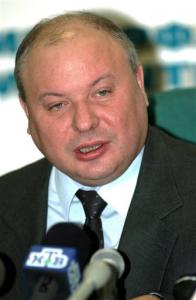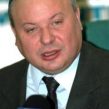
GAIDAR’S APPARENT POISONING FUELS CONSPIRACY THEORIES
Publication: Eurasia Daily Monitor Volume: 3 Issue: 222
By:

The international scandal triggered by the murder of former Federal Security Service (FSB) lieutenant colonel Alexander Litvinenko, who died in London on November 23 after apparently being poisoned by the radioactive element polonium-210, has intensified with news of the apparent poisoning of former prime minister Yegor Gaidar, who was the architect of Russia’s post-Soviet economic reform program. Gaidar lost consciousness at a conference in Dublin on November 24 soon after eating breakfast at his hotel. He was hospitalized in Ireland and then flown to Russia, where he remains in the hospital. Gaidar’s spokesman, Valery Natarov, said the former prime minister appears to have been deliberately poisoned. “Doctors don’t see a natural reason for the poisoning,” Natarov said. “So obviously we’re talking about poisoning, and it was not natural poisoning” (Associated Press, November 30).
While the British authorities have not publicly named any suspects in the Litvinenko poisoning, Kommersant on November 30 quoted Andrei Lugovoi, the former Russia security service officer who met with Litvinenko in London on November 1, the day Litvinenko fell ill, as confirming that he flew back to Moscow on November 3 on one of the grounded British Airways jets aboard which traces of polonium-210 were found. Lugovoi has denied any involvement in Litvinenko’s poisoning. Earlier, Lugovoi told the Moscow correspondent of a British newspaper that he thought he was being set up “as the fall guy” but that he could not understand who was doing it or why (Telegraph, November 24). Kommersant reported on December 1 that Lugovoi, who was officer in the KGB’s 9th Directorate in the late 1980s, was transferred in 1992 to the Main Guard Directorate (GUO), responsible for protecting top officials. In 1992-93, he was deputy head of the unit protecting then prime minister Yegor Gaidar. From 1997-2001, Lugovoi was head of security for ORT, the national television channel then controlled by Boris Berezovsky, and was accused in 2001 of organizing an attempted escape from prison of Nikolai Glushkov, a Berezovsky associate jailed for alleged large-scale embezzlement from Aeroflot. Lugovoi spent 14 months in prison. He has since pursued a successful business career.
Meanwhile, the Guardian on December 1 reported that police investigating the Litvinenko poisoning were “closing in on a group of men who entered the UK among a large crowd of Muscovite football [soccer] fans.” The British newspaper noted that Lugovoi arrived in London from Moscow with family and some friends on October 31 to attend the Arsenal-CSK Moscow match the following day. The Guardian also reported that British intelligence sources increasingly suspect Litvinenko was the victim of a plot involving “rogue elements” within the Russian state given that, according to investigators, “only those with access to state nuclear laboratories could have mounted such a sophisticated plot.” The newspaper added: “Officials now go so far as to say that the involvement of individuals within the FSB in the affair is ‘probable’ … Intelligence sources do not rule out the possibility that the perpetrators were ‘rogue elements’ either still in the FSB or former members of it.” The Guardian did note, however, that there was “no immediate link” between the Litvinenko case and Gaidar’s apparent poisoning.
A number of Russian observers, however, believe the cases are linked. Anatoly Chubais, the head of Russia’s electricity monopoly and a long-time close associate of Gaidar, told state-run Rossiya television that the theory Gaidar was the target of “attempted poisoning, attempted murder should undoubtedly be considered seriously” and that the “chain of deaths of … [journalist Anna] Politkovskaya, Litvinenko, and Gaidar would perfectly correspond to the interests and the vision of those people who are openly talking about a forceful, unconstitutional change of power in Russia as a possible option” (Associated Press, November 29). However, he ruled out any state involvement, which some observers took as a hint from Chubais that his nemesis from the Kremlin power struggles of the late 1990s, Berezovsky, was involved in the attacks (Times [UK], December 1; TIME.com, November 30).
Other observers share Chubais’ suspicion that the Politkovskaya, Litvinenko, and Gaidar cases are linked, but believe the Russian state was indeed involved — or, at any rate, a group or faction that is trying to force President Vladimir Putin to remain in power after his second and final constitutionally mandated term ends in 2008 (see EDM, October 23, November 27). Britain’s Times quoted Natalia Gevorkian, a columnist for Gazeta.ru, as saying: “There is a plot aimed at creating conditions that would rule out Putin’s stepping down.”
Andrei Piontkovsky, director of the Center for Strategic Research in Moscow, compared the Politkovskaya and Litvinenko murders, and the possible attempted poisoning of Gaidar, to the 1984 murder of pro-Solidarity priest Jerzy Popieluszko by Polish state security officers. Genernal Wojciech Jaruzelski later sanctioned the arrest and trial of Popieluszko’s killers.
“Murders or attempted murders of ‘enemies of the people’, lists of which are present on all the fascist websites, are taking place in the country,” Piontkovsky wrote. “The CIA, Berezovsky, [exiled former Yukos oil executive Leonid] Nevzlin, will be blamed [for the attacks] until the British present …officially and publicly, convincing evidence tracing Alexander Litvinenko’s murder to Moscow. Then the Russian president will have to take what might be the most important decision of his life. In his time, the head of Poland’s Communist regime, Wojciech Jaruzelski, confronted almost the same choice, when his special services brutally murdered ‘the enemy of the Polish people’ — Father Jerzy Popieluszko. He [Jaruzelski] could have tried to cover up that crime, which would have made him an indisputable accomplice. In that case, he would still be in prison today. But he preferred to prosecute the murderers and remains a respected statesman in post-Communist Poland” (Grani.ru, November 30).




